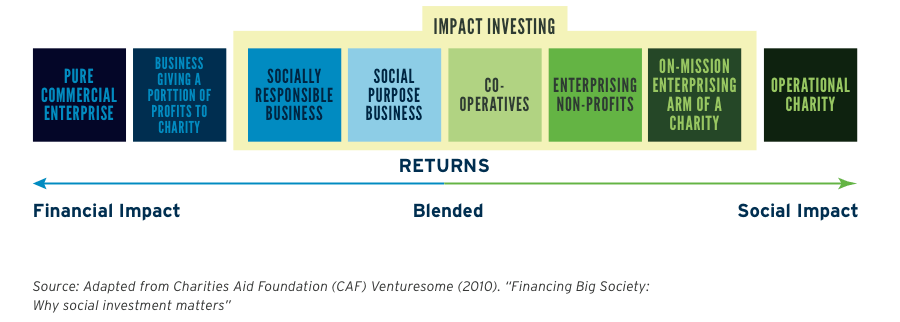Millennials Set to Bring Impact Investing to the Mainstream
Lisa Carter, JD, recently completed her second project with Social Enterprise Associates and her interest in helping social entrepreneurs was sparked once again. Lisa lives in Tucson, Arizona and can be contacted at carterlisah@gmail.com.
Why Are Millennials So Important to Impact Investing? Millennials are one of the most critical drivers of the impact investment strategy due to the transfer of wealth from Baby-Boomers to their children, i.e. the Millennials, those approximately 80 million individuals born in the United States between 1980 and 2000.
Millennials are one of the most critical drivers of the impact investment strategy due to the transfer of wealth from Baby-Boomers to their children, i.e. the Millennials, those approximately 80 million individuals born in the United States between 1980 and 2000.
The movement of wealth is important because the inheriting generations are predisposed toward social good and have grown up in a culture that calls on businesses to play a more active role in society. Their access to the internet will help them overcome the obstacle of informational and logistical challenges that previously deterred investors from exploring non-traditional markets.

They pose an opportunity for this generation to invest billions of dollars into impact investments over traditional investment vehicles. Over the next 40 years Gen Y and the millennials will potentially inherit an estimated $41 trillion from the baby-boomer Generation.
The beliefs and values of the millennials will be the drivers behind the world's political, social, environmental and economic changes. The millennials are the largest generation in American history-approximately 20 million larger than the baby-boomer generation.
According to Jed Emerson and Lindsay Norcott, "They have had the unique shared experiences of major boom and bust periods,  including the 1990s dot-com boom, the collapse of the financial markets in 2008, to the subsequent recession. They are the first truly global generation having shared experiences across cultures and geography, including wars, and are more connected by technology than any generation before them."
including the 1990s dot-com boom, the collapse of the financial markets in 2008, to the subsequent recession. They are the first truly global generation having shared experiences across cultures and geography, including wars, and are more connected by technology than any generation before them."
Importantly, they are willing to accept a higher risk profile or receive lower returns to invest in companies that create positive social or environmental impact. Another study, by Spectrem Group, found that 45 percent of wealthy millennials want to use their wealth to help others and consider social responsibility a factor when making investment decisions.
The Appeal of Impact Investing
Impact Investing is turning out to be an appealing investment approach because it provides a new way of tackling the world's most pressing issues while still providing an acceptable financial return. It also enables investors to place their money according to their values without forgoing financial opportunities. JPMorgan forecasts a drastic increase in these types of investments as money changes hands on a generational scale.  They estimate that impact investing may expand from about $9 billion today to $1 trillion by 2020.
They estimate that impact investing may expand from about $9 billion today to $1 trillion by 2020.
The Challenge
The challenge is a lack of industry standard measures of impact outcomes that provide for a clear standardization for success that firms can hold their companies and their investment accountable for true impacts.
What Needs to Happen
To convert this opportunity into a long-lasting benefit three things need to happen:
1) Firms need to build impact investing expertise among financial advisers. The well-established firms are just now building impact investment expertise. The smaller, mostly independent firms that have a strong practice are well positioned to gain market shares,
2) Improve impact measurement. For skeptical millennials impact measurement is important to unlocking investments even though it is sometimes complicated and resource-intensive, and
3) make impact investing research and resources open and available to would-be investors.
A majority of millennials identify themselves as "self-directed" investors who seek out their own information, spend a significant time researching alternatives and consult multiple resources before making major investment decisions.
Conclusion
Millennials desire to have investments manifest social good. Much of today's modern financial markets still regard it as a niche. The wealth transfer to millennials has the potential to direct billions of dollars toward social and environmental good and entrench this important practice as a mainstream investment strategy. Investment banks like UBS are well on their way to serving the needs of the millennials by convening conferences to ascertain the values of the millennials and to demonstrate their expertise in social impact investing. Watch for more of this activity as the millennials come of age.
Find Us Online
Coming Events
Native Learning Center Webinar: Strategic Planning for Housing
Invest Local
 We help businesses and nonprofits to access the capital they need to grow.
We help businesses and nonprofits to access the capital they need to grow. See our Resources Guide, and visit our Page.
Newsletter
SIGN UP - PAST ISSUES

Using the power of business to solve social
and environmental problems.




